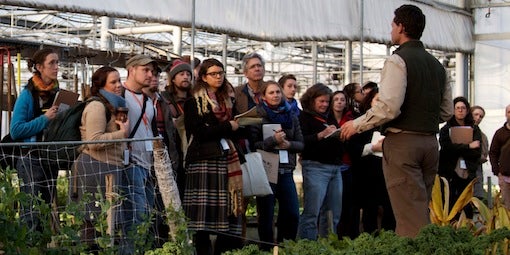Beginning Farmer Workshops at Stone Barns

Beginning Farmer Workshops at Stone Barns Center for Food and Agriculture in Poncantico Hills, New York
The Growing Farmers Initiative at the Stone Barns Center for Food and Agriculture in Pocantico Hills, NY holds beginning farmer workshops on Thursday afternoons. Workshops are free and open to the public. Please explore our April and May sessions:
Soil Testing & Fertility Management | April 7
The goal of this class, taught by Zach Wolf, is to have participants work through the process of drafting soil management plans. We will look at example soil tests and go through the process of calculating amendment application rates. The latter part will cover how to integrate soil mineral amendments with the management of cover crops, compost, mulches and inoculates to create a holistic soil management plan. We will talk about pasture management, but the bulk of the class is specific for vegetable growers.
Botany for Farmers | April 14
This workshop will be an interactive lecture and discussion about some foundational topics in plant science relevant to growing fruits and vegetables. The main topics will be (1) plant form and patterns of growth, (2) plant reproduction, and (3) plant nutrition. Although the emphasis will be on basic plant science, we will make frequent cross-references with agricultural practice.
Compost | April 21
We will explore the various Composting Systems in place at Stone Barns and discuss the science, experience and insight necessary to produce premium quality compost for a range of agricultural and horticultural applications. This class will be held outdoors and will be hands on, focusing on active windrow and static aerated composting methods for all organic materials.
Land Assessment | April 28
This workshop will take students into the field (weather permitting) for hands-on land assessment. We will conduct a soil sample, measure compaction, assess biological systems, and discuss methods of improving or degrading the existing system.
Farm Financials | May 12
Most farmers keep some sort of financial records in order to file taxes and/or apply for a loan. Within the numbers are details about the farm’s operations — its efficiency and profitability. Being able to create financial statements is the first part. Next is learning how to use the statements to garner important information about your business and plan for growth. In this workshop, we will discuss the basic layout of the Income Statement and Balance Sheet. We will go over each statement to understand how to read them: not just “Is my business profitable?” but more richly, “What can I do to improve profitability,” “How can I improve cash flow,” and “Can I afford to make capital improvements or take out a loan?” With a basic understanding of the financial statements, we’ll talk about how to use your historical data to create projections for the purposes of business planning and applying for loans. Finally, we will discuss how the financial projections fit into the bigger picture of business planning. We will review real financial statements and leave plenty of time to address the specific questions and concerns of the attendees.
Tillage | May 19
Join Cornell Cooperative Extension Educator Justin O’Dea for a workshop on soil tillage in agriculture. The workshop will explore why tillage practices have long been a facet of agriculture, different types of tillage, the effects of tillage on soils, and tillage strategies that work to conserve soils and build soil health. The workshop will involve participatory problem-solving and a field walk.
Cover Crops | May 26








 Your Privacy Choices
Your Privacy Choices
Leave a comment